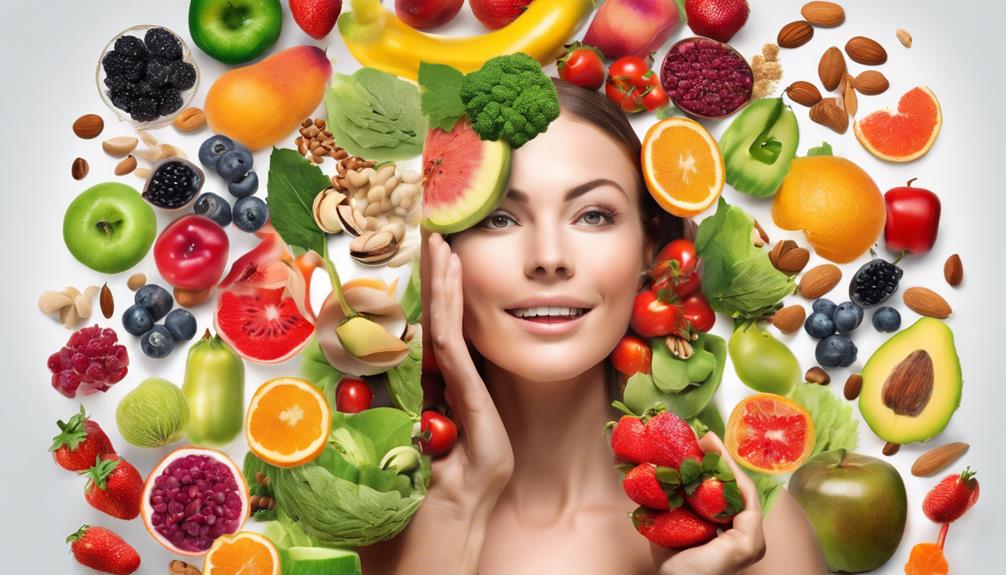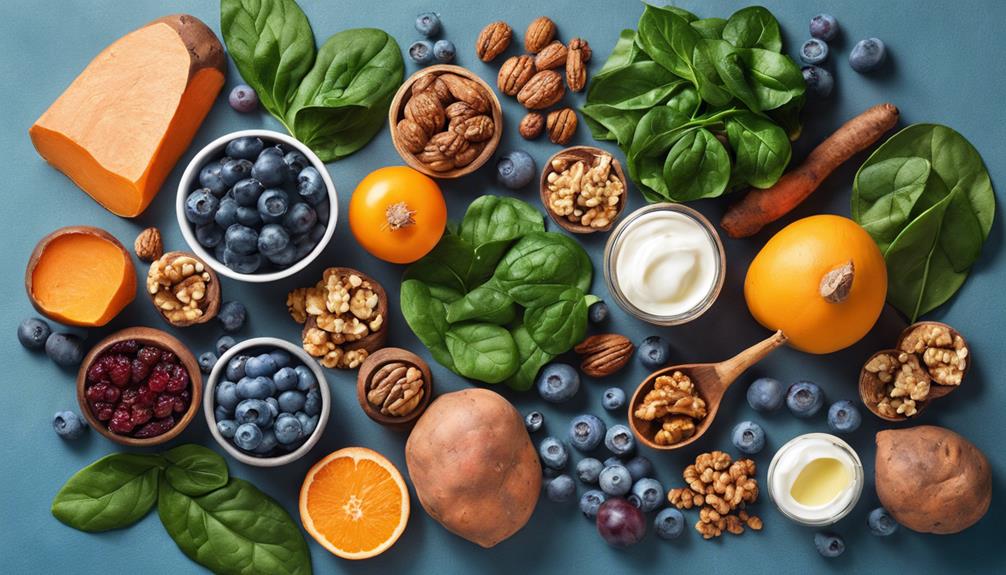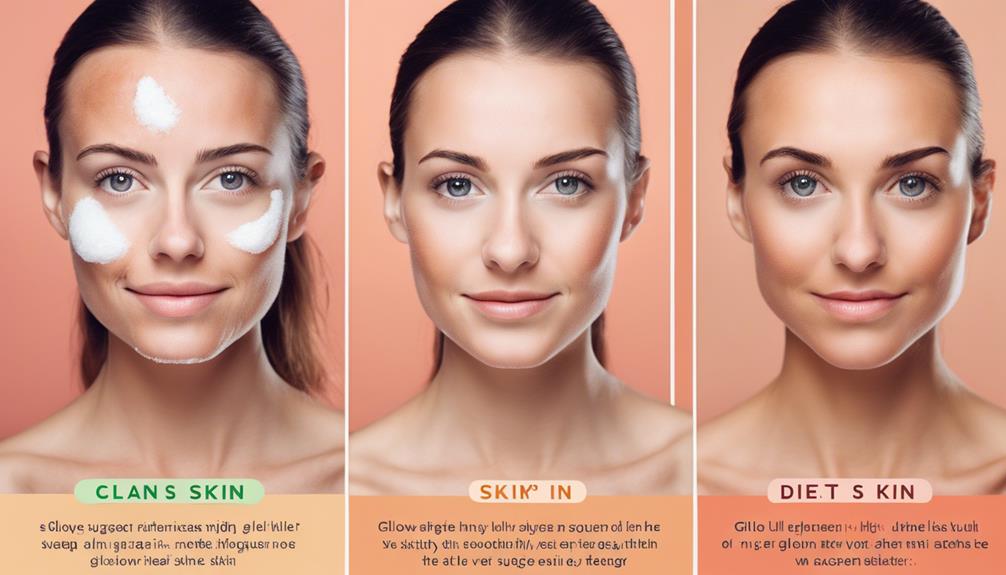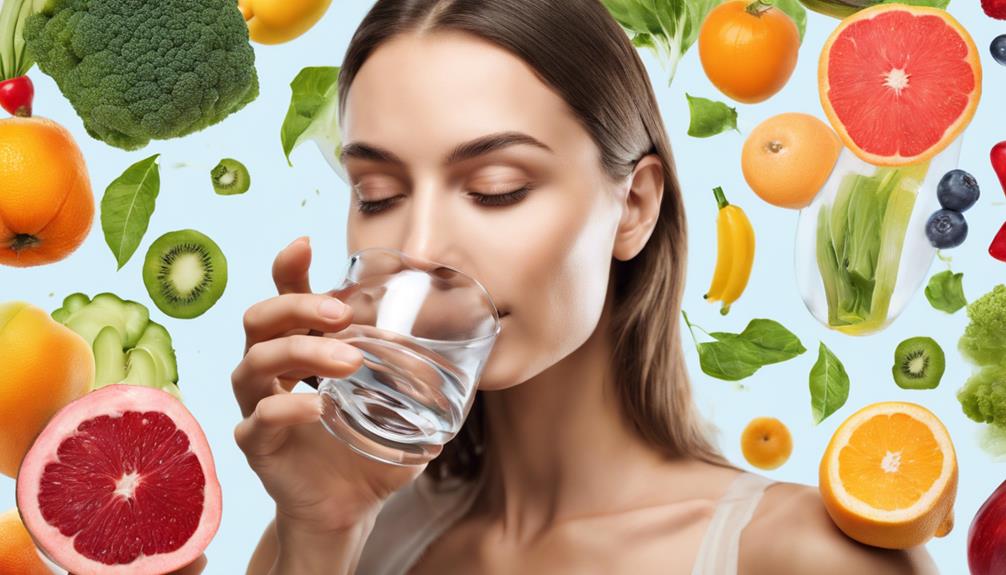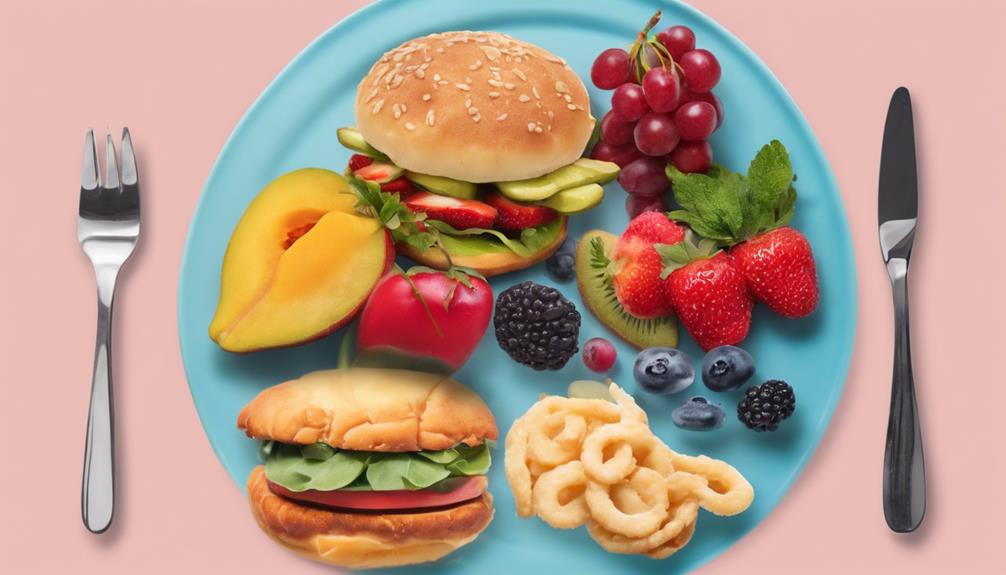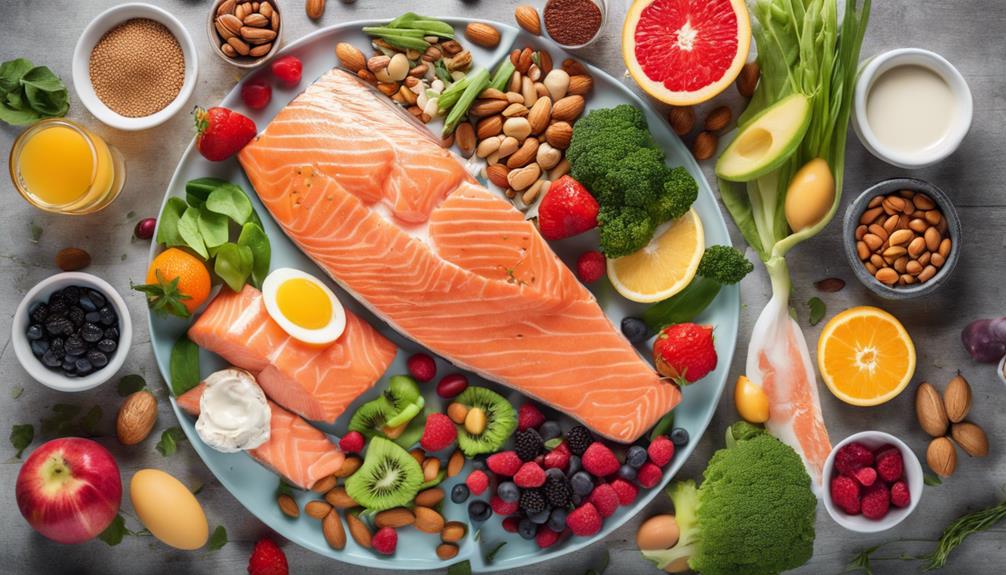Healthy Skin Starts With Diet
If you've ever noticed how your skin looks tired and dull after a weekend of indulging in greasy fast food and sugary treats, you're not alone. Your diet plays a significant role in the health and appearance of your skin. But what specific foods can truly make a difference in achieving that coveted healthy glow? Let's explore the connection between what you eat and the condition of your skin, and how simple dietary changes can lead to lasting improvements in your skin's vitality and radiance.
Key Takeaways
- Balanced meals with lean proteins, whole grains, fruits, and vegetables support skin health.
- Hydration is essential for skin elasticity and plumpness.
- Healthy fats from avocados, nuts, and seeds maintain skin moisture.
- Limit processed foods high in sugar and unhealthy fats for skin vitality.
- Antioxidant-rich foods like berries and oranges protect skin from environmental damage.
Importance of Nutrition for Skin
When it comes to maintaining healthy skin, the role of nutrition can't be overstated. Your skin rejuvenation and overall health greatly depend on the nutrients you consume. Nutrient absorption plays a crucial role in ensuring your skin receives the essential vitamins, minerals, and antioxidants it needs to stay vibrant and youthful.
To support skin rejuvenation, focus on a diet rich in vitamins A, C, and E. These vitamins are powerful antioxidants that help fight off free radicals, promoting healthy skin cells and collagen production.
Additionally, minerals like zinc and selenium aid in skin repair and protection from environmental damage.
Proper nutrient absorption is key to reaping the benefits of a healthy diet. To enhance absorption, consider incorporating probiotics and prebiotics into your meals to support gut health, which is closely linked to skin health.
Furthermore, stay hydrated to improve nutrient transport throughout your body, promoting optimal skin function and appearance. Remember, what you eat directly impacts your skin's vitality and resilience.
Hydration and Skin Health
Maintaining adequate hydration is crucial for optimal skin health. Hydration and aging are interconnected, as dehydration can lead to dry, dull skin and accentuate the appearance of fine lines and wrinkles. Water intake plays a significant role in supporting skin elasticity, ensuring a plump and youthful complexion.
To enhance your skin's health through hydration, consider the following:
- Drink Sufficient Water: Aim to consume at least 8-10 glasses of water daily to keep your skin hydrated from within.
- Use Hydrating Skincare Products: Incorporate moisturizers and serums with hyaluronic acid or glycerin to lock in moisture.
- Limit Caffeine and Alcohol: These beverages can dehydrate your skin; balance them with additional water intake.
- Eat Water-Rich Foods: Include fruits like watermelon and cucumber in your diet for added hydration.
- Consider Humidifiers: Using a humidifier in your living space can help maintain optimal moisture levels in the air, benefiting your skin.
Antioxidant-Rich Foods
Strengthening your skin's natural defense against environmental stressors and aging begins with incorporating antioxidant-rich foods into your diet. Antioxidants are powerful compounds that help protect your skin from damage caused by free radicals. Including antioxidant-rich foods like berries, dark leafy greens, nuts, and seeds in your daily meals can provide your skin with the necessary nutrients to maintain its health and radiance.
One delicious way to boost your antioxidant intake is by enjoying antioxidant-rich smoothies. Blend together berries, spinach, and chia seeds for a refreshing and skin-nourishing treat.
Additionally, incorporating skin-boosting snacks like almonds, carrots, and green tea throughout your day can further enhance the antioxidant protection for your skin.
Essential Fatty Acids for Skin
To further fortify your skin's defenses and promote its overall health, it's beneficial to focus on incorporating essential fatty acids into your daily diet. Essential fatty acids, such as Omega-3, play a crucial role in maintaining healthy skin. These skin-friendly fats can help improve your skin's appearance and texture from within.
Here are some key benefits of essential fatty acids for your skin:
- Omega-3 Benefits: Omega-3 fatty acids have anti-inflammatory properties that can help reduce redness and inflammation in the skin, promoting a clearer complexion.
- Skin Friendly Fats: Incorporating healthy fats like avocados, nuts, and seeds into your diet can help nourish your skin and maintain its natural elasticity.
- Improved Hydration: Essential fatty acids help maintain the skin's natural oil barrier, preventing moisture loss and keeping your skin hydrated.
- Enhanced Skin Repair: These fats aid in skin repair and regeneration, helping to heal wounds and reduce scarring.
- Protection Against UV Damage: Some studies suggest that Omega-3 fatty acids may offer some protection against UV-induced skin damage.
Impact of Sugar on Skin
Sugar, often considered a culprit in various health concerns, can also have a significant impact on the health and appearance of your skin. Excessive sugar consumption can lead to inflammation in the body, which in turn can manifest on your skin.
Research has shown a correlation between high sugar intake and acne breakouts. When you consume sugary foods or beverages, it can spike your blood sugar levels, triggering a cascade of events that promote inflammation. This inflammation can exacerbate skin conditions like acne, leading to more frequent breakouts and potentially worsening existing skin issues.
To maintain healthy skin, it's essential to be mindful of your sugar intake and opt for a balanced diet rich in whole foods that support skin health. By reducing your sugar consumption and focusing on nourishing your body with nutrient-dense foods, you can help prevent inflammation and support clearer, healthier skin from the inside out.
Vitamins and Minerals for Skin
Ensuring your skin's health and vitality involves more than just external care; the right vitamins and minerals play a crucial role in supporting your skin's overall well-being. Incorporating skin-friendly supplements and nutrient-rich foods into your diet can provide your skin with the essential nourishment it needs to glow from within.
- Vitamin C: Boosts collagen production, aiding in skin elasticity and repair.
- Vitamin E: Acts as a powerful antioxidant, protecting the skin from damage caused by free radicals.
- Omega-3 Fatty Acids: Help maintain skin hydration and reduce inflammation for a clear complexion.
- Zinc: Supports skin cell renewal and helps regulate oil production, preventing breakouts.
- Selenium: Protects against UV damage and promotes an even skin tone.
Benefits of Drinking Water
For optimal skin health, staying hydrated is key. The benefits of drinking water extend far beyond quenching your thirst. Hydration benefits your skin by maintaining its elasticity, giving it a youthful and radiant appearance.
When you're adequately hydrated, your skin cells are plump and full, reducing the appearance of fine lines and wrinkles. Water helps flush out toxins from the body, preventing skin issues like acne and dullness.
Proper hydration also supports the skin's natural barrier function, protecting it from external aggressors like pollution and UV rays. This barrier helps retain moisture, keeping your skin supple and smooth.
To enhance skin elasticity, aim to drink at least eight glasses of water a day. You can also increase your water intake by consuming water-rich foods like cucumbers and watermelon.
Incorporating more water into your daily routine is a simple yet powerful way to promote healthy, glowing skin from within. Start prioritizing hydration today for skin that looks and feels its best.
Superfoods for Skin Glow
Looking to achieve a radiant complexion naturally? Superfoods can be your secret weapon for glowing skin. These nutrient-rich foods are packed with vitamins and antioxidants that can help nourish your skin from the inside out. Try incorporating the following superfoods into your diet to enhance your skin's natural beauty:
- Avocados: Rich in healthy fats and vitamin E, avocados help moisturize and soften your skin.
- Berries: Blueberries, strawberries, and raspberries are full of antioxidants that combat free radicals and promote a youthful complexion.
- Leafy Greens: Spinach, kale, and other leafy greens are high in vitamins A and C, essential for skin repair and rejuvenation.
- Walnuts: These nuts are a great source of omega-3 fatty acids, which can reduce inflammation and keep your skin supple.
- Green Tea: Beauty boosting teas like green tea are rich in catechins, which have anti-inflammatory and anti-aging properties.
Foods to Avoid for Clear Skin
To maintain clear and healthy skin, it's crucial to be mindful of the foods you consume. Certain foods can exacerbate skin issues and lead to breakouts, making it essential to understand what to avoid for a radiant complexion. When it comes to skincare routines, steering clear of known acne triggers is paramount.
Processed foods high in refined sugars and unhealthy fats can disrupt your skin's balance, triggering acne flare-ups. Additionally, dairy products have been linked to increased sebum production and inflammation, contributing to skin problems. It's wise to limit your intake of foods like milk, cheese, and ice cream if you struggle with acne-prone skin.
Furthermore, greasy and fried foods can also wreak havoc on your skin by clogging pores and promoting excess oil production. Opt for healthier cooking methods like baking or grilling to support clearer skin. By avoiding these culprits and making mindful choices in your diet, you can better support your skin's health and overall appearance.
Gut Health and Skin Connection
Achieving healthy, glowing skin isn't just about what you put on your skin but also what you put into your body. Your gut health and skin are more connected than you may realize. The state of your digestive system can significantly impact the health and appearance of your skin. Here's why this connection is crucial:
- Skin Microbiome: Your skin has its own ecosystem of bacteria, fungi, and viruses that play a vital role in maintaining skin health.
- Digestive Health: A healthy gut can lead to clearer skin as it helps in reducing inflammation and promoting better nutrient absorption.
- Gut-Brain-Skin Axis: There's a direct communication pathway between your gut, brain, and skin, showing how your mental health, gut health, and skin health are interconnected.
- Probiotics: Consuming probiotic-rich foods can help balance the bacteria in your gut and improve skin conditions like acne and eczema.
- Hydration: A well-hydrated gut promotes healthy digestion, which in turn reflects on your skin's appearance.
Nourishing your gut can lead to a radiant complexion and overall skin health.
Protein for Skin Repair
Your skin's ability to repair and regenerate itself is heavily reliant on the intake of adequate protein. Protein plays a crucial role in collagen production, the main structural protein in the skin responsible for its strength and elasticity. Collagen is essential for maintaining the skin's firmness and smoothness, aiding in the reduction of wrinkles and fine lines.
Amino acids, the building blocks of protein, are vital for skin repair processes. They help in the formation of new skin cells, promoting a healthy and youthful complexion. Consuming protein-rich foods such as lean meats, fish, eggs, dairy products, legumes, and nuts ensures an adequate supply of amino acids for skin regeneration.
To support your skin's repair mechanisms, aim to include a variety of protein sources in your diet. By nourishing your body with sufficient protein, you're giving your skin the tools it needs to stay resilient, healthy, and vibrant. Remember, protein isn't only beneficial for muscle building but also plays a significant role in maintaining your skin's strength and vitality.
Healthy Skin Diet Tips
With a focus on maintaining healthy skin, incorporating a well-balanced diet rich in essential nutrients is paramount. To achieve a radiant complexion, consider the following healthy skin diet tips:
- Skin friendly fruits: Incorporate fruits like berries, oranges, and watermelon into your daily meals. These fruits are packed with vitamins and antioxidants that promote skin health.
- Balanced meals: Ensure your meals consist of a variety of food groups such as lean proteins, whole grains, fruits, and vegetables. A balanced diet provides the necessary nutrients for skin repair and rejuvenation.
- Hydration: Drink an adequate amount of water daily to keep your skin hydrated and plump. Hydration is key for maintaining skin elasticity.
- Healthy fats: Include sources of healthy fats like avocados, nuts, and seeds in your diet. These fats help maintain skin moisture and protect against inflammation.
- Limit processed foods: Minimize your intake of processed foods high in sugar and unhealthy fats, as they can lead to skin issues like acne and premature aging.
Frequently Asked Questions
Can Specific Fruits Cause Skin Breakouts?
Yes, specific fruits like bananas can indeed cause skin breakouts for some individuals. Grapefruit can also exacerbate acne in certain cases. It's important to pay attention to your body's reactions to different foods to maintain healthy skin.
Is There a Link Between Caffeine Intake and Skin Health?
Drinking caffeine can impact skin health. It can dehydrate your skin, leading to dryness and potential breakouts. However, moderate caffeine intake can have skincare benefits like reducing inflammation and improving blood flow, enhancing skin hydration.
How Does Stress Affect Skin Conditions?
When stress storms in, your skin weathers the chaos. Stress management is key to maintaining a balanced hormone harmony. Your skin reflects your inner calm. Nurture yourself, and watch your skin glow with health.
Are There Any Foods That Can Worsen Eczema?
Certain foods like those high in sugar can worsen eczema due to their inflammatory effects. For some individuals, gluten sensitivity may also exacerbate symptoms. Being mindful of your sugar intake and potential sensitivities can help manage eczema.
Can Dairy Products Impact Skin Texture?
Dairy products can impact skin texture due to potential inflammatory responses. Consider dairy alternatives to support gut health, which may positively influence skin health. Experiment to determine how your skin reacts to different dietary choices.
Conclusion
You may think that achieving healthy skin is simply about what you put on your face, but the truth is, it all starts with what you put in your body. So, next time you reach for that sugary snack or skip out on your veggies, remember that your skin will thank you for making better choices. Remember, good skin isn't just skin-deep, it's diet-deep.

